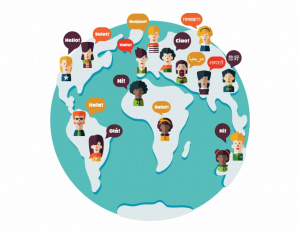Difference between revisions of "Language/Multiple-languages/Culture/Language-comparisons"
< Language | Multiple-languages | Culture
Jump to navigation
Jump to search
m (Quick edit) |
|||
| (14 intermediate revisions by 3 users not shown) | |||
| Line 1: | Line 1: | ||
{{Multiple-languages-flag}} | |||
If you have learned some languages, you will want to ask a question like this: what can I do to express something in this language. | If you have learned some languages, you will want to ask a question like this: what can I do to express something in this language. | ||
Different languages have different answers. | Different languages have different answers. If we treat a language as a system, then we can study it as studying a system. | ||
A grammatical rule is like a function in a programming language: give it some input, and get the output. Natural languages do it in various ways. Given the different sets of context, like the time, person, gender, number, etc. as the input, the output may be different or same in different languages. | |||
There are many online comparisons of programming languages. Here is a comparison of natural languages. | |||
This course is far from being completed. | |||
* [https://polyglotclub.com/wiki/Language/Multiple-languages/Vocabulary/Pronouns Pronouns] | |||
* [https://polyglotclub.com/wiki/Language/Multiple-languages/Vocabulary/Numerals Numerals] | |||
* [https://polyglotclub.com/wiki/Language/Multiple-languages/Vocabulary/Family-in-many-languages Vocabulary of family] | |||
* [https://polyglotclub.com/wiki/Language/Multiple-languages/Grammar/Various-word-orders-in-various-languages Word orders] | |||
* [https://polyglotclub.com/wiki/Language/Multiple-languages/Grammar/TeKaMoLo-in-multiple-languages Order of adjectives] | |||
== | ==Other Lessons== | ||
[[Language/Multiple-languages/ | * [[Language/Multiple-languages/Culture/Ideas-about-language-learning|Ideas about language learning]] | ||
* [[Language/Multiple-languages/Culture/Wiki-Notice-Board|Wiki Notice Board]] | |||
* [[Language/Multiple-languages/Culture/Calendar-and-Clock|Calendar and Clock]] | |||
* [[Language/Multiple-languages/Culture/How-to-contribute-to-wiki-lessons-(FAQ)|How to contribute to wiki lessons (FAQ)]] | |||
* [[Language/Multiple-languages/Culture/Licensed-Free-Databases|Licensed Free Databases]] | |||
* [[Language/Multiple-languages/Culture/Techniques-for-learning-languages|Techniques for learning languages]] | |||
* [[Language/Multiple-languages/Culture/How-to-Customise-Open–Source-Language-Games|How to Customise Open–Source Language Games]] | |||
* [[Language/Multiple-languages/Culture/Videos-of-Everyday-Life|Videos of Everyday Life]] | |||
* [[Language/Multiple-languages/Culture/How-to-become-a-polyglot|How to become a polyglot]] | |||
* [[Language/Multiple-languages/Culture/Most-Popular-Forums-around-the-World|Most Popular Forums around the World]] | |||
<span links></span> | |||
Latest revision as of 23:27, 26 March 2023
If you have learned some languages, you will want to ask a question like this: what can I do to express something in this language.
Different languages have different answers. If we treat a language as a system, then we can study it as studying a system.
A grammatical rule is like a function in a programming language: give it some input, and get the output. Natural languages do it in various ways. Given the different sets of context, like the time, person, gender, number, etc. as the input, the output may be different or same in different languages.
There are many online comparisons of programming languages. Here is a comparison of natural languages.
This course is far from being completed.
Other Lessons[edit | edit source]
- Ideas about language learning
- Wiki Notice Board
- Calendar and Clock
- How to contribute to wiki lessons (FAQ)
- Licensed Free Databases
- Techniques for learning languages
- How to Customise Open–Source Language Games
- Videos of Everyday Life
- How to become a polyglot
- Most Popular Forums around the World
